April 8 on COVID-19 in MN: Active cases, hospitalizations trending higher
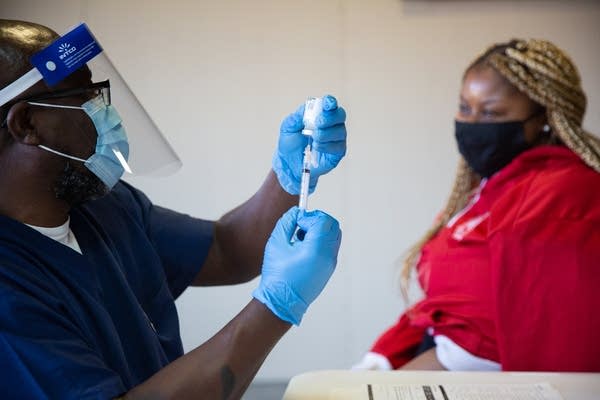
Go Deeper.
Create an account or log in to save stories.
Like this?
Thanks for liking this story! We have added it to a list of your favorite stories.
3 things to know
Hospitalization admission, active case trends highest in months
About 43 percent of adults with at least one dose; 28 percent completely vaccinated
Vaccination effort means Minnesota likely won’t see as severe a spike in cases as it saw in November, health commissioner says
Updated: 5:25 p.m.
Hope and worry remain recurrent themes in Minnesota’s COVID-19 numbers.
Active cases are trending now at levels not seen since the start of the year. Hospitalizations are climbing. But the vaccination effort continues apace, and Minnesota appears to be on track to have 50 percent of adults vaccinated within two weeks.
Thursday’s Health Department data showed more than 1.2 million Minnesotans fully inoculated while 1.9 million have received at least one dose, including about 83 percent of residents age 65 and older. The agency reported about 52,000 more vaccinations.
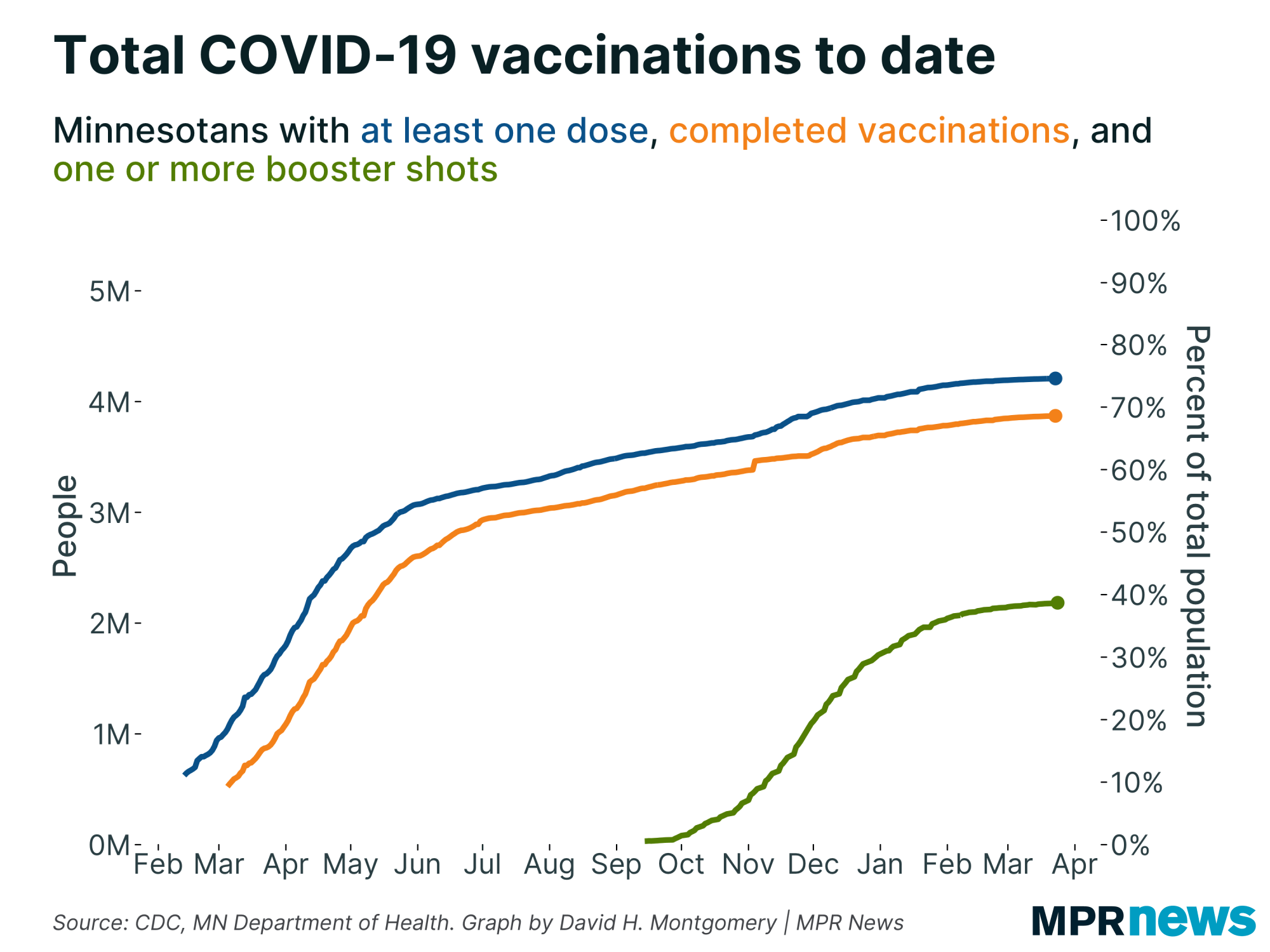
Thanks to vaccinations, Minnesota likely won’t see as severe a spike in cases this spring as it saw in November and December, but the pandemic isn’t over, Minnesota Health Commissioner Jan Malcolm told reporters Tuesday.
Turn Up Your Support
MPR News helps you turn down the noise and build shared understanding. Turn up your support for this public resource and keep trusted journalism accessible to all.
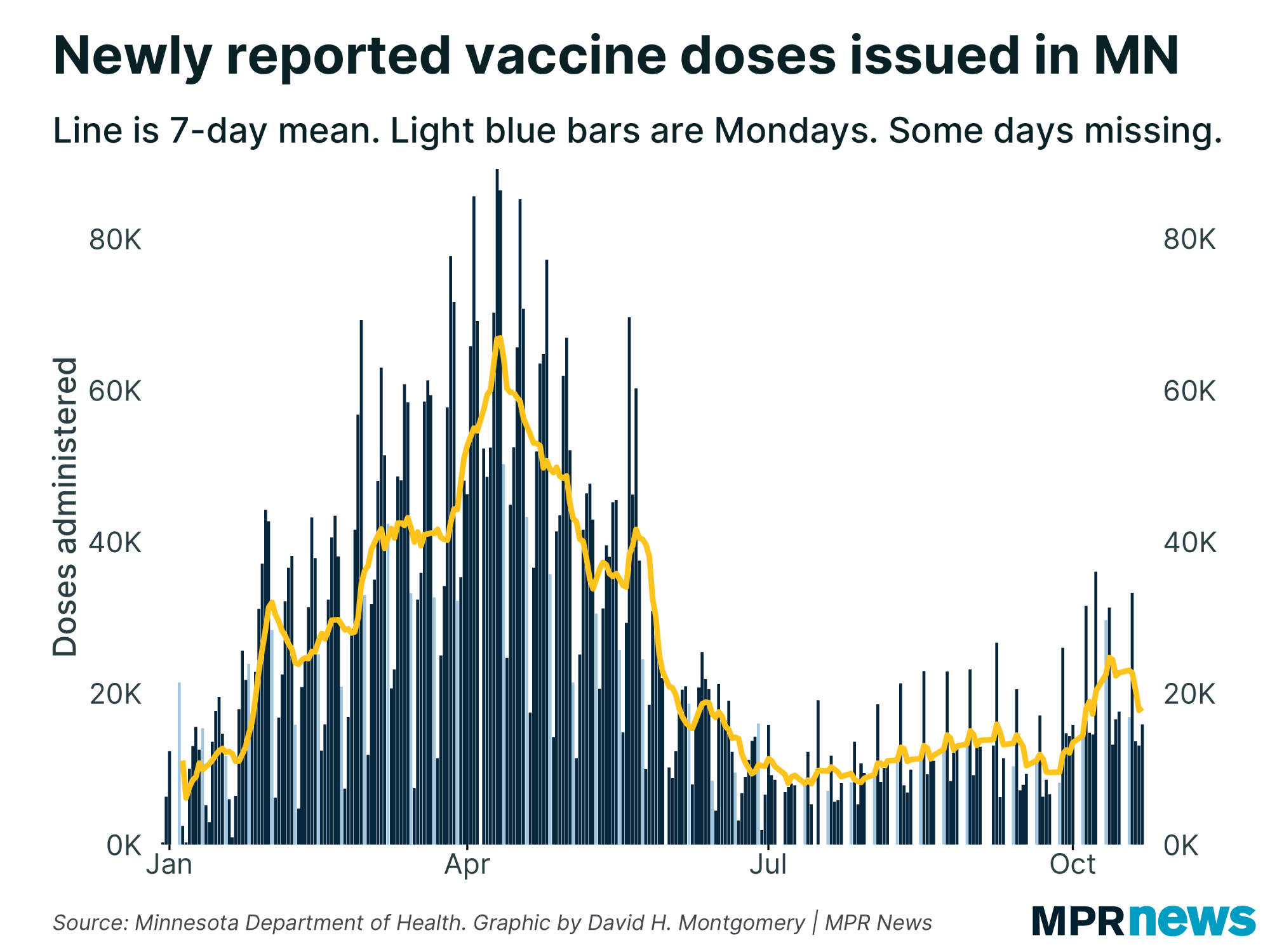
“We’re definitely not out of the woods yet,” Malcolm added, noting that the seven-day positive test rate for the disease is back up at 6 percent. A 5 percent rate is a warning sign of growing spread.
Minnesota officials have repeatedly described the state’s current COVID-19 situation as a kind of competition to inoculate as many Minnesotans as possible before the disease variants get a stronger foothold in the state. Officials estimate that up to 60 percent of new COVID-19 infections in Minnesota are now due to variants, particularly the B.1.1.7 strain that originated in the U.K.
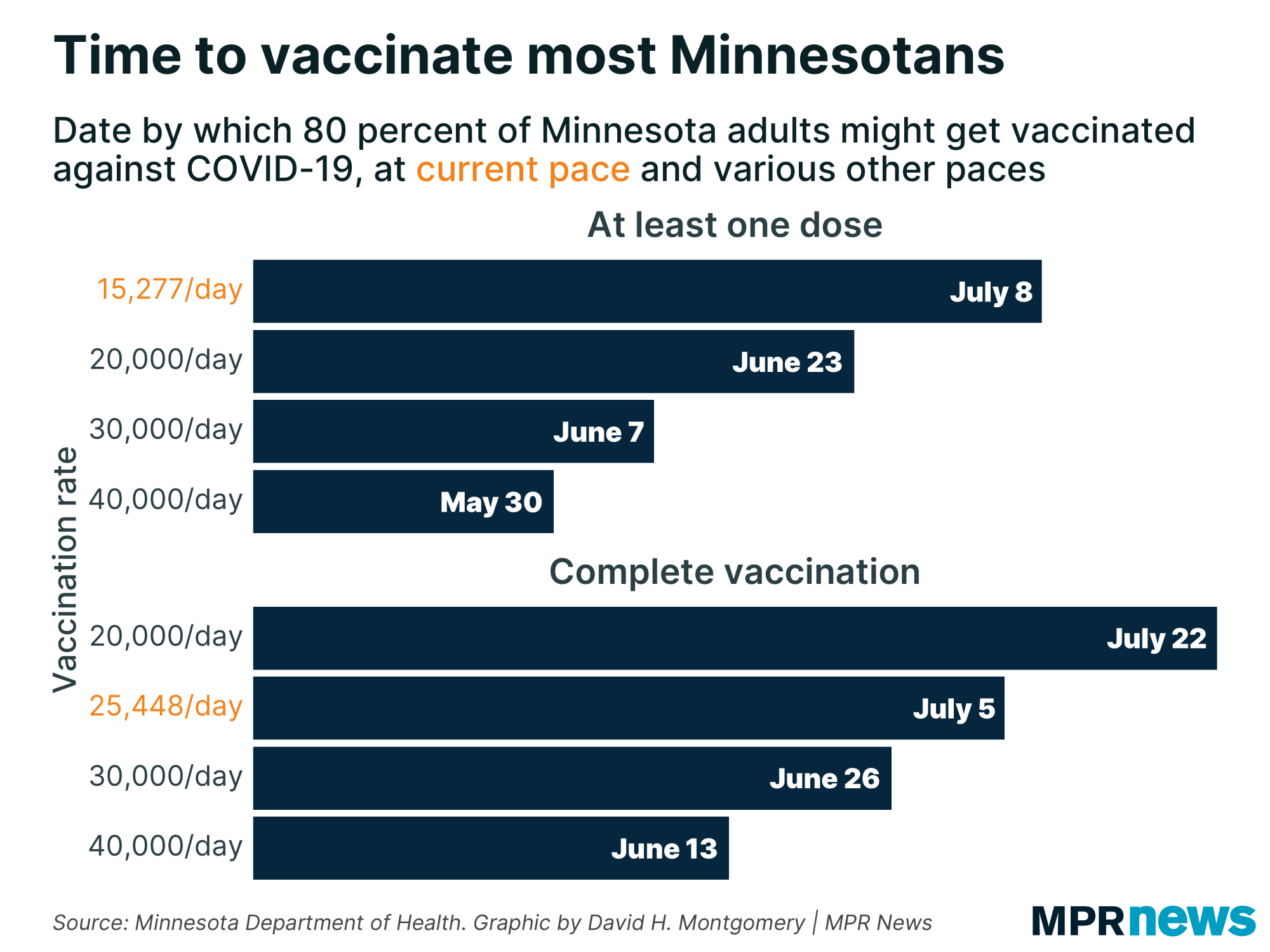
Hospitalizations climbing, skewing younger
Minnesota’s latest COVID-19 numbers reinforce Malcolm’s cautionary view.
Hospitalizations, for instance, have climbed significantly in the past few weeks to levels not seen since January. The most recent agency data shows 565 people with COVID-19 in Minnesota hospitals; 131 needed intensive care.
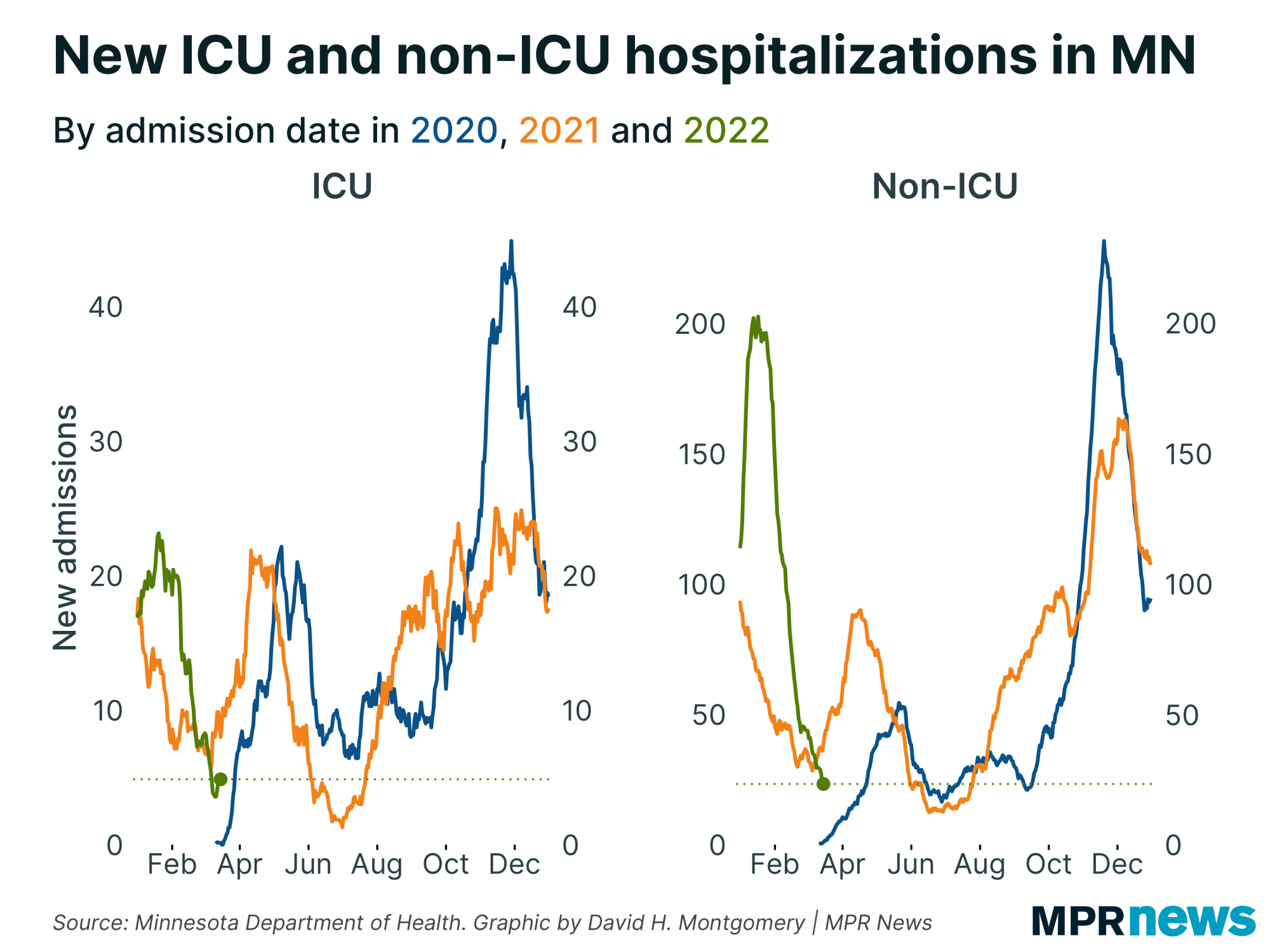
The age of those needing hospitalization has been skewing younger.
The average age of people hospitalized during the pandemic is 65, but it was 57 years old from March 23 to 29, Dr. Ruth Lynfield, the state’s epidemiologist, said Tuesday.
The median age for deaths is 83 years old through the pandemic, but in March it was 78, she noted.
The number of known, active cases has been trending upward over the past few weeks, with more than 17,000 as of Thursday’s report — marking three weeks with active daily counts above 10,000 and the first time since late December that count has crossed 17,000.
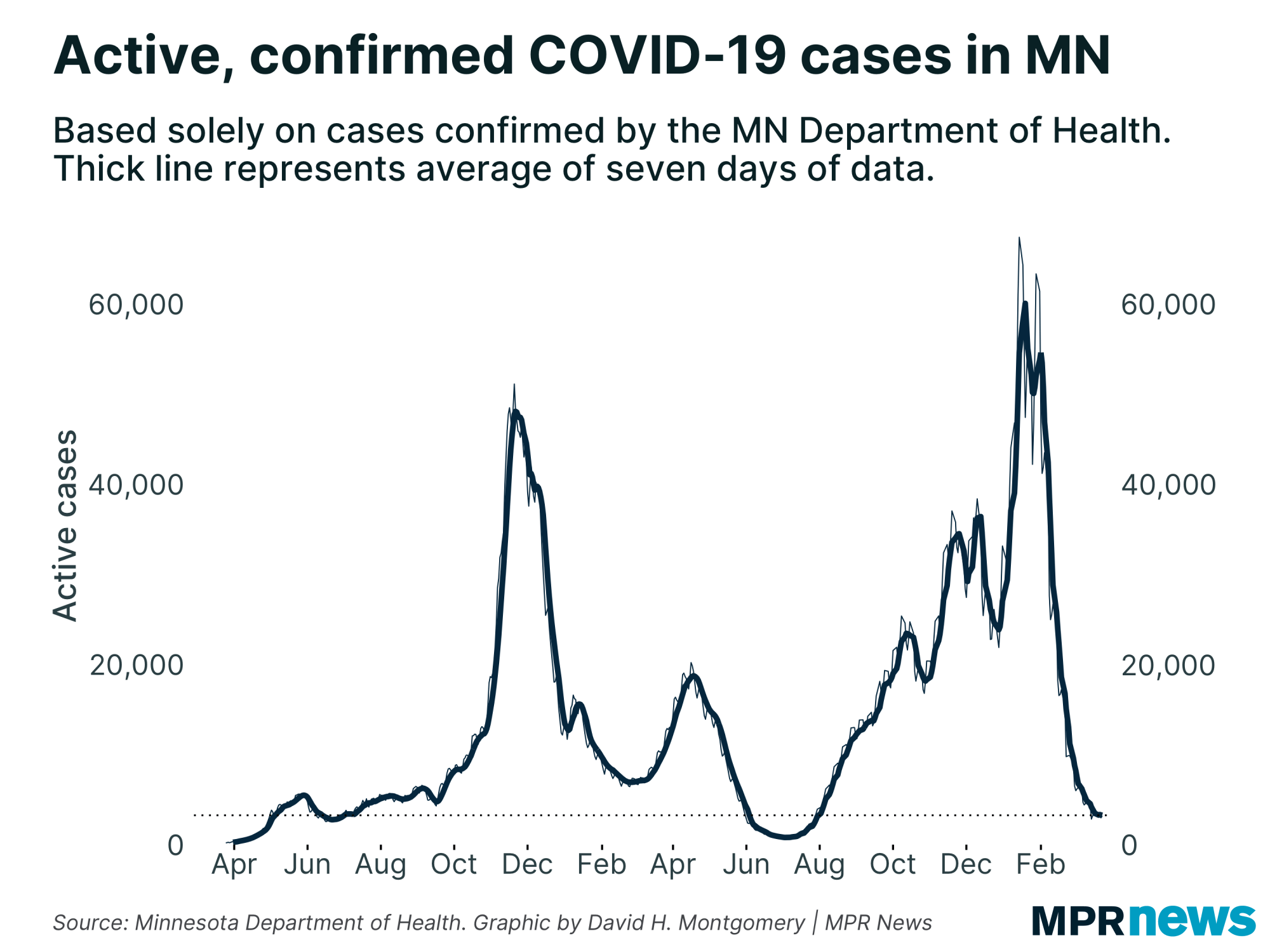
While still low compared to late November and early December, the rising trend is notable given the worries over the rise of the highly contagious U.K. COVID-19 variant, B.1.1.7, which state health officials suspect is driving the current upswing.
The state has now confirmed about 1,600 cases in the state of the U.K. strain, Lynfield said Thursday, adding that it’s linked to five deaths here and likely responsible for the majority of the spread happening now.
Fourteen deaths reported on Thursday raised Minnesota’s overall pandemic death toll to 6,922. Among those who’ve died, about 62 percent had been living in long-term care or assisted living facilities; most had underlying health problems.
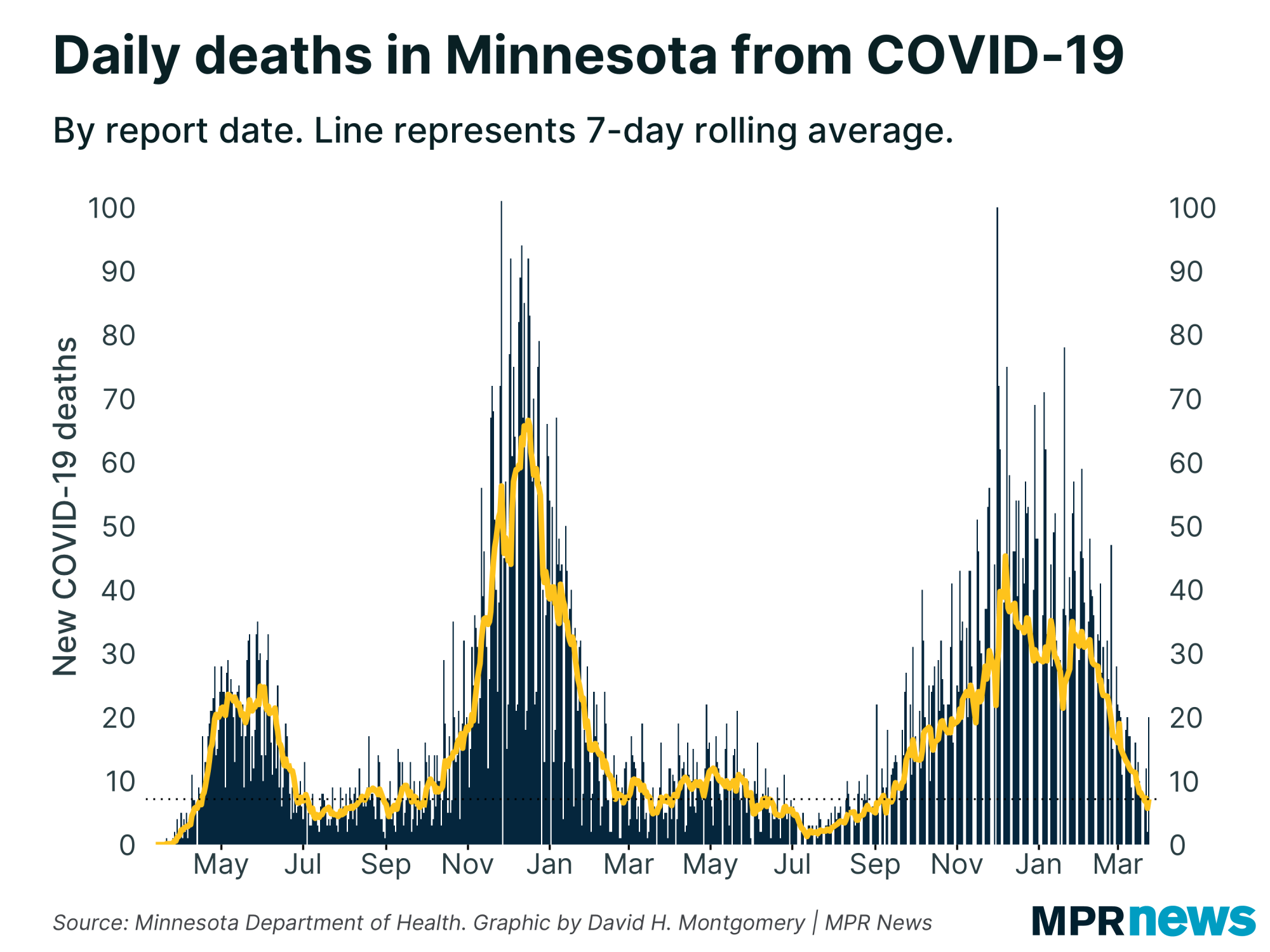
The state has recorded 535,182 total confirmed or probable cases so far in the pandemic, including 2,535 posted Thursday. About 95 percent of Minnesotans known to be infected with COVID-19 in the pandemic have recovered to the point where they no longer need to be isolated.
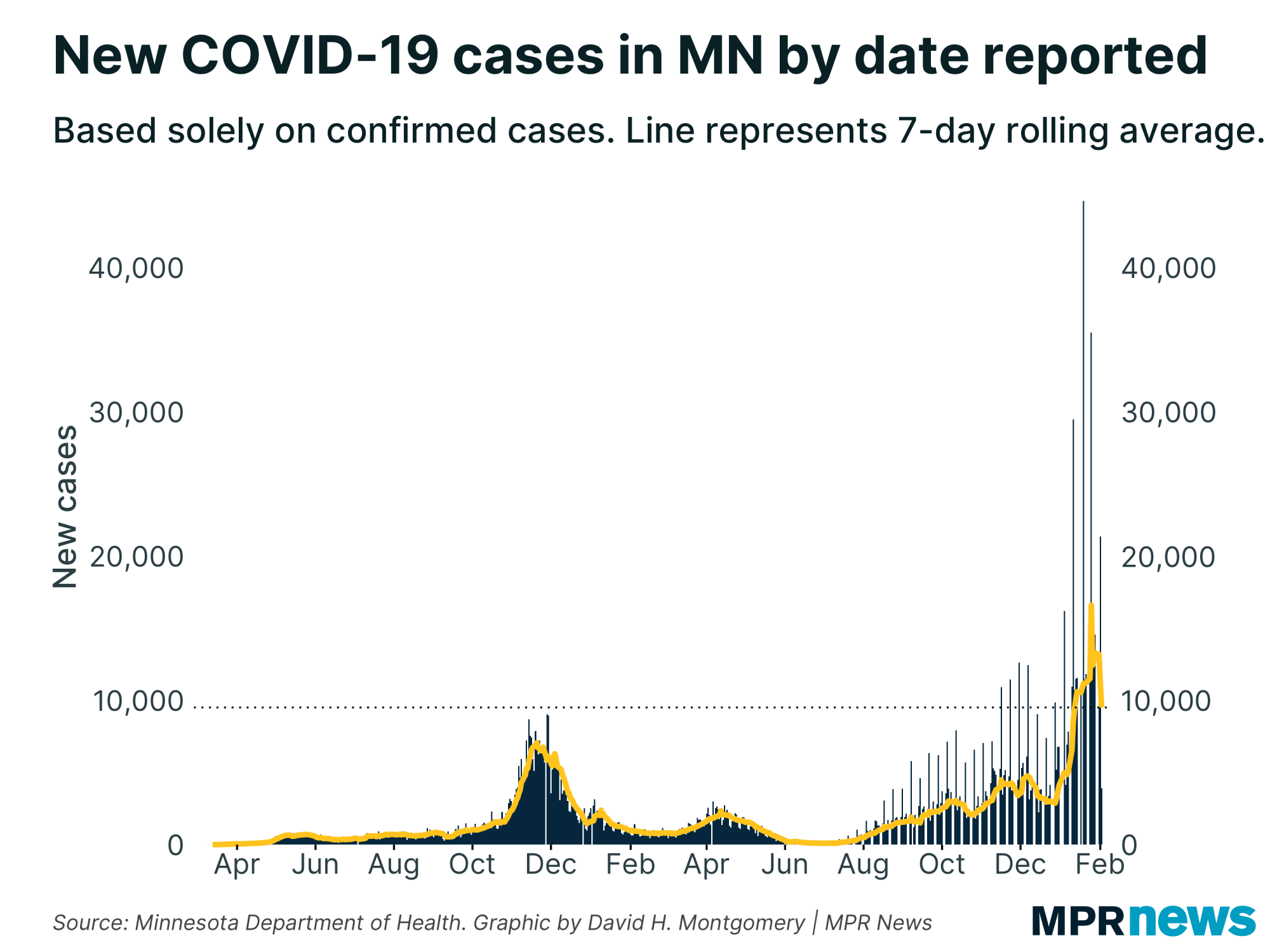
Regional hot spots bubble
Regionally, all parts of Minnesota are in better shape than they were in late November and early December. The latest numbers, however, show cases creeping up in almost every region of the state.
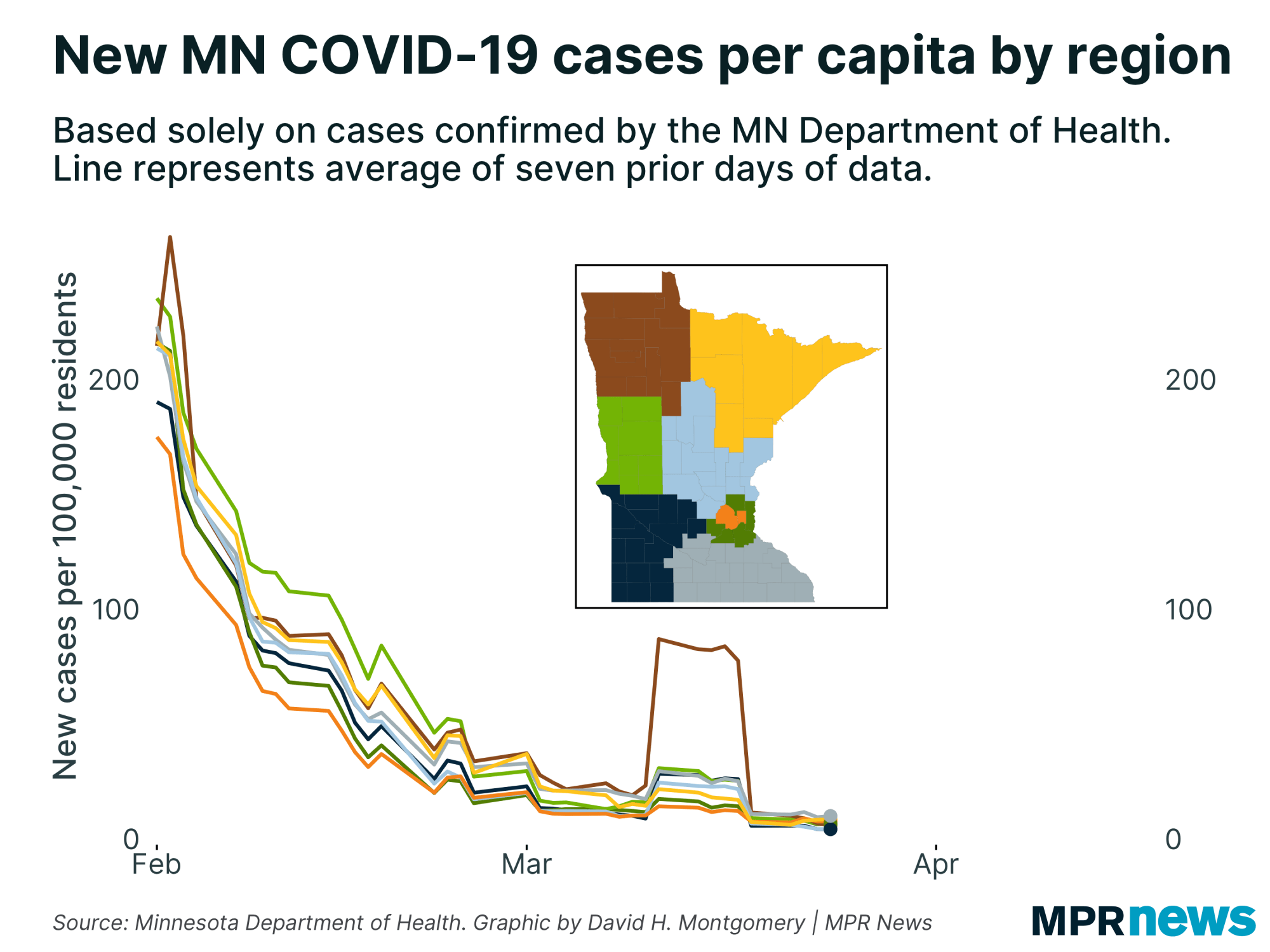
Public health leaders continue to keep watch on clusters in the southwest Twin Cities metro area as well as Mankato in southern Minnesota and around Aurora and Ely in the northeast. Central Minnesota is also seeing a rise in positive COVID-19 cases.
Cases spread across age groups
People in their 20s still make up the age bracket with the state’s largest number of confirmed cases — more than 99,000 since the pandemic began, including more than 52,000 among those ages 20 to 24.
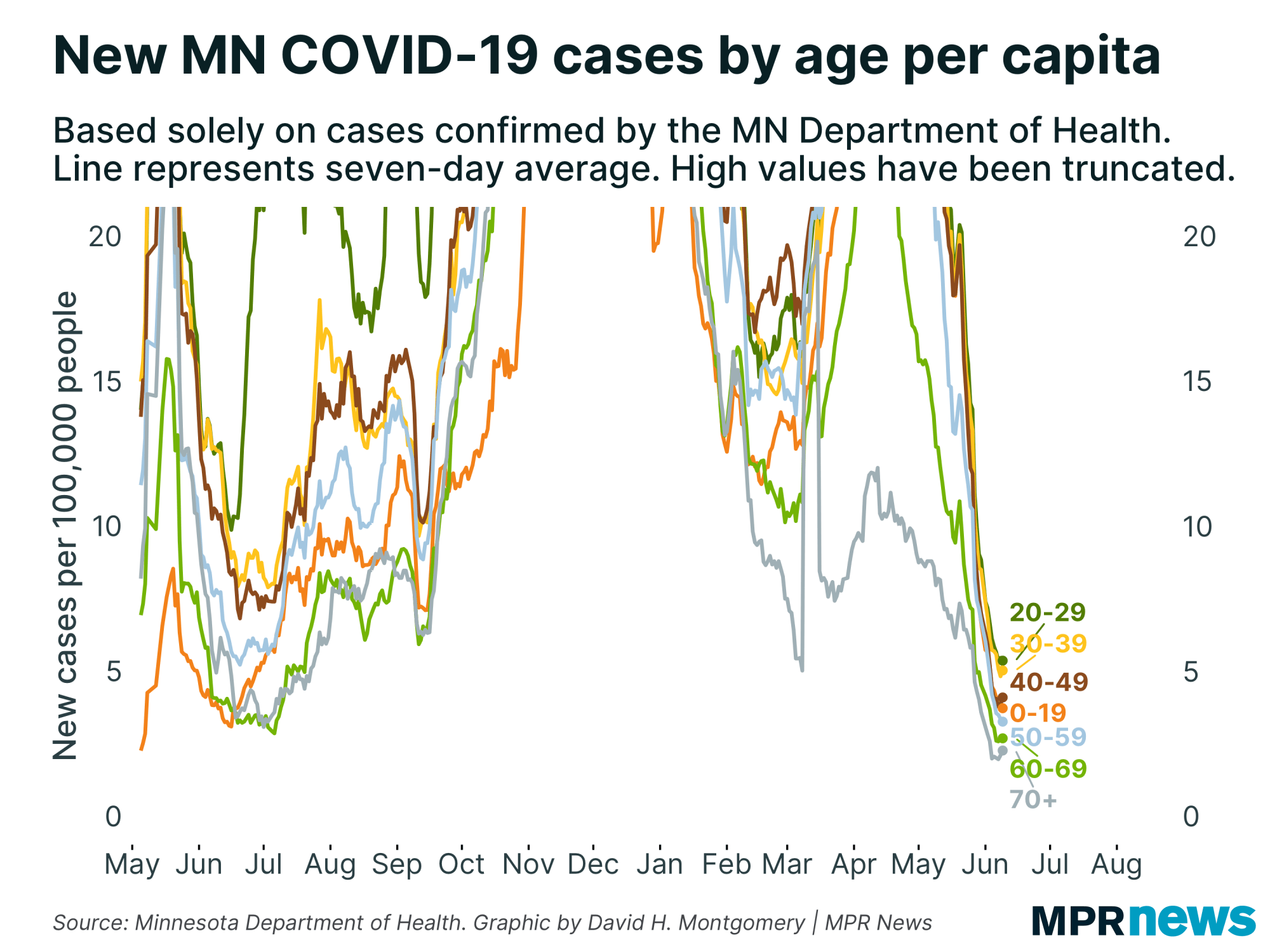
The number of high school-age youth confirmed with the disease has also grown, with more than 42,000 total cases among those ages 15 to 19 since the pandemic began.
With kids increasingly returning to school buildings and sports, Minnesota public health officials are urging Minnesota families with children to get tested every two weeks for COVID-19 until the end of the school year.
Although young people are less likely to feel the worst effects of the disease and end up hospitalized, experts worry they will spread it unknowingly to older relatives and members of other vulnerable populations. Those with the coronavirus can spread it when they don’t have symptoms.
Caseloads among people of color
In Minnesota and across the country, COVID-19 has hit communities of color disproportionately hard in both cases and deaths. That’s been especially true for Minnesotans of Hispanic descent for much of the pandemic.
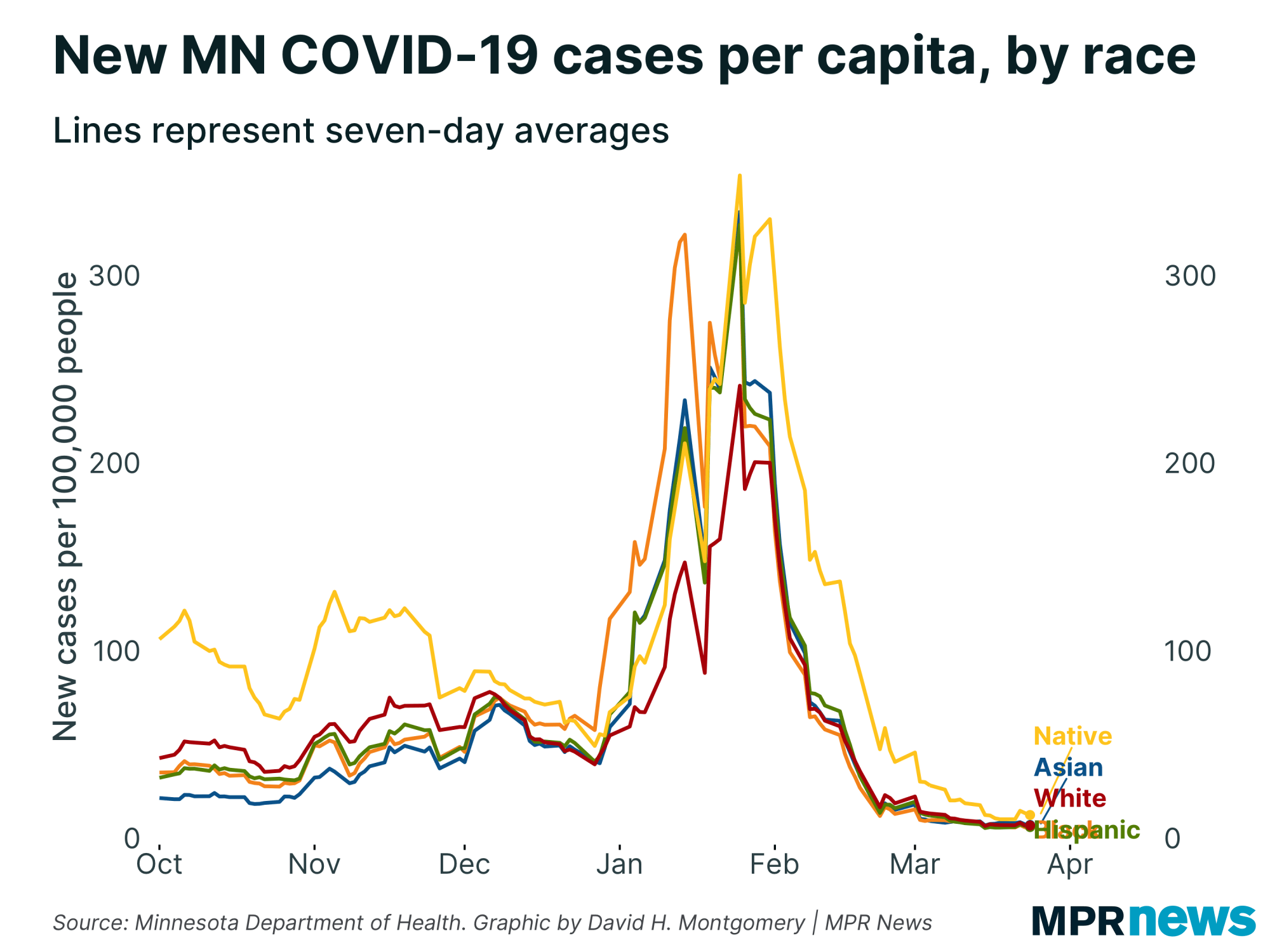
Even as new case counts continue to track well below their late November, early December peaks, the data shows Latino people continue to be hit hard.
Distrust of the government, together with deeply rooted health and economic disparities, have hampered efforts to boost testing among communities of color, officials say, especially among unauthorized immigrants who fear their personal information may be used to deport them.
Officials have acknowledged that distrust by communities of color has been a problem during the pandemic. They’ve offered up some data on vaccinations broken down by race and ethnicity that they’re updating regularly.
COVID-19 in Minnesota
Data in these graphs are based on the Minnesota Department of Health's cumulative totals released at 11 a.m. daily. You can find more detailed statistics on COVID-19 at the Health Department website.
Latest developments
COVID pushes ‘Hamilton’ in Mpls. back to 2023
Hennepin Theatre Trust said Thursday that due to the continued effects of COVID-19 on the touring Broadway industry, it must push back “Hamilton” in Minneapolis to April 4-May 7, 2023.
The award-winning production was previously scheduled to run this year from July 27 to Aug. 29.
Season ticket holders will be automatically moved to the rescheduled date and contacted directly by Hennepin Theatre Trust by email with further information, the organization said Thursday.
— MPR News Staff
Top headlines
Vaccination campaign aims to protect Muslims from COVID ahead of Ramadan: The Muslim American Society of Minnesota obtained 7,000 doses of vaccine from the state and is rushing to put shots in people's arms before the holy month begins next week.
Feeling guilty, anxious about your COVID-19 vaccine search? You're not alone: Every day, thousands more Minnesotans are receiving a COVID-19 vaccine. The legions of vaccine selfies make it clear that getting the shot is a huge relief for many. But some are experiencing other emotions — anxiety, if they haven't gotten vaccinated yet, and sometimes guilt, if they were able to secure an appointment.
Play ball! Largest state gathering in a year set for Target Field: The Minnesota Twins will welcome thousands of fans back to Target Field on Thursday for their home opener. Some experts say with cases up significantly in Minnesota and the B.1.1.7 variant rapidly spreading now is not the time to gather in large groups.
CDC says more virulent British strain of coronavirus now dominant in U.S.: The variant known as B.1.1.7, which is more easily spread, was first identified in England last fall. Since then, it has spread quickly in the U.S.
Black nurse volunteers give COVID shots to Minnesota's most vulnerable: Inequities persist between how easily and quickly Minnesotans of color are getting vaccinated for COVID-19, as compared to their white neighbors. Helping to bridge that gap is a volunteer network of Black nurses, who say giving shots in familiar locations is key to getting more people of color vaccinated more quickly.
Ridership plunges on Northstar line amid pandemic, sparking debate over its future: Metro Transit says ridership has plummeted 96 percent since before the pandemic. That's led one state lawmaker to call for the commuter rail line to be shut down.


